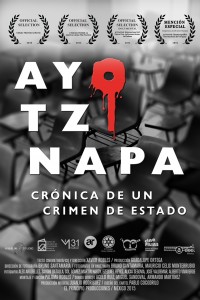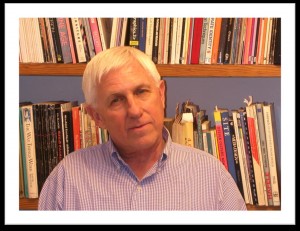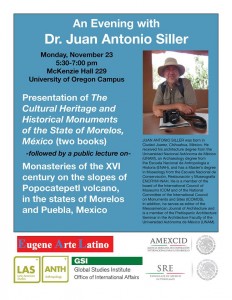Events
Spring Film Series. Ayotzinapa: Crónica de un crimen de estado
Film Viewing: Ayotzinapa: Crónica de un crimen de estado
Ayotzinapa: Chronicle of a Crime of State is the story of the forced disappearance of 43 student teachers, which exposes the criminal complicity between the police and military authorities, and the political and economic elite of Mexico. TRT 101 minutes.
May 4th, 2016 5:00 p.m. Straub 156
Film to be followed by a round table with Anabel López Salinas (CLLAS Postdoctoral Fellow), Erin Gallo (PhD candidate in Romance Languages), Eduardo Corona (Center for Intercultural Organizing, Washington County), Antonio Salgado (Ayotzinapa in Eugene), Pedro García-Caro (Director, Latin American Studies Program).
We will connect directly via telephone conference with the mother of one of the 43 disappeared students.
[embeddoc url=”https://las.uoregon.edu/files/2016/04/Ayotzinapa-poster-1ap9557.pdf” download=”all” viewer=”google”]
Watch the trailer here!
A Bold Peace – Costa Rica’s Demilitarization
On April 27, 6-8:00 pm in Straub Hall 145, UO Sociology Professor Michael Dreiling will screen his revelatory documentary, A Bold Peace, on the impact of Costa Rica’s radical choice of national disarmament. Hors d’oeuvres and refreshments. Comments and a Q&A will follow the film.
www.aboldpeace.com – trailer & press kit
TRT: 105 minutes
English, Spanish with English Subtitles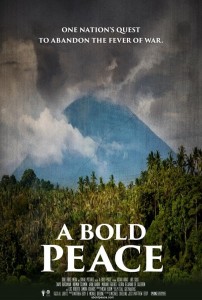
More than 60 years ago, Costa Rica became one of the only nations in the world to disband their military and to redirect national resources towards education, health, and the environment. Since then, Costa Rica has earned the number one spot in the Happy Planet Index, a ranking of countries based on the ecological footprint to behind the happiness and health of its citizens.
A Bold Peace juxtaposes the national policy of demilitarization (since 1948-49) with their investment in education, health, and the environment. Pointed parallels and contrasts are made with recent U.S. debates over the national debt, healthcare, the environment, and the escalating cost of U.S. militarism. The film builds from historical footage leading to the 1948 revolution and extensive interviews of former presidents, officials and scholars from the University of Costa Rica, Costa Rican government officials and ambassadors, leaders of major national co-operatives, and journalists and citizens of Costa Rica. Unfortunately, the Costa Rican example has received very little international attention. This documentary film brings attention to Costa Rica’s inspirational national project, answering why happiness, health, and human rights occupy a relatively prominent place in this Central American country.
Sponsored by: Latin American Studies, College of Arts & Sciences, International Studies, Political Science, Sociology, Global Justice Program, History, and the Crossings Institute
Brazilian author Salgado Maranhão and his translator Alexis Levitin
Monday, April 18th, RL, LAS and Translation Studies will host Brazilian Poet Salgado Maranhão and translator Alexis Levitin on our campus. We will have a Brown Bag @ 12pm at the Mills International Center and a public bilingual reading/discussion at 4:30pm at the Browsing Room in the Knight Library. I hope you can join us for some of these event! Find below a short bio on both Salgado Maranhão and Alexis Levitin.
======================================= =======================================
Salgado Maranhão won the prestigious Prêmio Jabuti in 1999 with Mural of Winds. In 2011, The Color of the Word won the Brazilian Academy of Letters highest poetry award. In 2014, the Brazilian PEN Club chose his recent collection, Mapping the Tribe, as best book of poetry for the year. In 2015 the Brazilian Writers Union gave him first prize, again for The Color of the Word. His newest book is Opera of Nos, launching in September in Rio de Janeiro. In addition to ten books of poetry, he has written song lyrics and made recordings with some of Brazil’s leading jazz and pop musicians. His work has appeared in numerous magazines in the USA, including Bitter Oleander, BOMB, Cream City Review, Dirty Goat, Florida Review, Massachusetts Review, and Spoon River Poetry Review. Here in the USA, he is represented by two bilingual collections of poetry: Blood of the Sun (Milkweed Editions, 2012) and Tiger Fur (White Pine Press, 2015).
Alexis Levitin’s thirty-nine books of translation include Clarice Lispector’s Soulstorm and Eugenio de Andrade’s Forbidden Words, both from New Directions. Recent books include Salgado Maranhão’s Blood of the Sun (Milkweed Editions, 2012), Eugenio de Andrade’s The Art of Patience (Red Dragonfly Press, 2013), Ana Minga’s Tobacco Dogs (The Bitter Oleander Press, 2013), Santiago Vizcaino’s Destruction in the Afternoon (Diálogos Books, 2015), Sophia de Mello Breyner Andresen’s Exemplary Tales (Tagus Press, 2015) and Salgado Maranhão’s Tiger Fur (White Pine Press, 2015). In 2012, Levitin and Maranhao completed a three month reading tour of the USA, visiting over fifty colleges and other institutions. In tre spring of 2016, they will be reading from Blood of the Sun and Tiger Fur in the Northeast, the Midwest, and the West Coast.
First LALISA Congress
Latin American, Latino, & Iberian Studies of the Pacific Northwest
New Temporal Regimes in Literature, History, and the Social Sciences
APRIL 8 & 9, 2016
Reed College, Portland, OR
LAS Winter Speaker Series: Edy Kaufman
February 9, 2016 at 3:30 p.m. Knight Library Browsing Room
TACE- Academic Diplomacy Cuba/USA: Lessons Learnt and Best Practices
Dr. Edward Edy Kaufman holds degrees in Political Science, International Relations and Sociology from the Hebrew
University of Jerusalem, a doctorate from the University of Paris (Sorbonne) in diplomatic history and post-doctoral
studies in Social Science Research Methodology at the University of Michigan, Ann Arbor. He has authored and coauthored
12 books and more than seventy articles in the general area of international relations, with an emphasis on
human rights and conflict resolution topics, and a regional specialization on Latin America and the Middle East, and
continues more than two decades team-teaching with one of them. His current research and advocacy interest are in
merging the paradigms of human rights and conflict resolution.
Prof. Kaufman has served both as Director of Center for International Development and Conflict Management [CIDCM]
at the University of Maryland and the Truman Institute for the Advancement of Peace at the Hebrew University in
Jerusalem. Dr. Kaufman is an expert in the areas of the teaching and training of conflict transformation, and
facilitation of workshops with CIDCM’s “Partners in Conflict” program. He has done extensive action research in
strengthening civil society and peacebuilding with the Palestinian-Israeli conflict, often also working jointly with
Egyptians and Jordanians,, as well as in Africa, Central, East and South Asia, the Former Soviet Union and the
Americas, including on ethnic, religious and water resource conflicts as well as human rights and democracy issues.
In the area of human rights, his work focuses on human rights education and training of the law enforcement
agencies, particularly in Latin America.
[embeddoc url=”https://las.uoregon.edu/files/2016/01/W16-LAS-Speaker-Series-1wkd0rr.pdf” download=”all” viewer=”google”]
LAS Winter Speaker Series: Edy Kaufman
February 2, 2016 at 3:30 p.m. Knight Library Browsing Room
The Jewish Dimension in the Repression Under Military Rule in Argentina [1976-1983]: The Bigger Picture and a Case Study
Dr. Edward Edy Kaufman holds degrees in Political Science, International Relations and Sociology from the Hebrew
University of Jerusalem, a doctorate from the University of Paris (Sorbonne) in diplomatic history and post-doctoral
studies in Social Science Research Methodology at the University of Michigan, Ann Arbor. He has authored and coauthored
12 books and more than seventy articles in the general area of international relations, with an emphasis on
human rights and conflict resolution topics, and a regional specialization on Latin America and the Middle East, and
continues more than two decades team-teaching with one of them. His current research and advocacy interest are in
merging the paradigms of human rights and conflict resolution.
Prof. Kaufman has served both as Director of Center for International Development and Conflict Management [CIDCM]
at the University of Maryland and the Truman Institute for the Advancement of Peace at the Hebrew University in
Jerusalem. Dr. Kaufman is an expert in the areas of the teaching and training of conflict transformation, and
facilitation of workshops with CIDCM’s “Partners in Conflict” program. He has done extensive action research in
strengthening civil society and peacebuilding with the Palestinian-Israeli conflict, often also working jointly with
Egyptians and Jordanians,, as well as in Africa, Central, East and South Asia, the Former Soviet Union and the
Americas, including on ethnic, religious and water resource conflicts as well as human rights and democracy issues.
In the area of human rights, his work focuses on human rights education and training of the law enforcement
agencies, particularly in Latin America.
[embeddoc url=”https://las.uoregon.edu/files/2016/01/W16-LAS-Speaker-Series-1wkd0rr.pdf” download=”all” viewer=”google”]
LAS Winter Speaker Series: Edy Kaufman
January 26, 2016 at 3:30 p.m. Knight Library Browsing Room
Latin America and the Israeli/Palestinian Conflict: Part of the Problem or Part of the Solution?
Dr. Edward Edy Kaufman holds degrees in Political Science, International Relations and Sociology from the Hebrew
University of Jerusalem, a doctorate from the University of Paris (Sorbonne) in diplomatic history and post-doctoral
studies in Social Science Research Methodology at the University of Michigan, Ann Arbor. He has authored and coauthored
12 books and more than seventy articles in the general area of international relations, with an emphasis on
human rights and conflict resolution topics, and a regional specialization on Latin America and the Middle East, and
continues more than two decades team-teaching with one of them. His current research and advocacy interest are in
merging the paradigms of human rights and conflict resolution.
Prof. Kaufman has served both as Director of Center for International Development and Conflict Management [CIDCM]
at the University of Maryland and the Truman Institute for the Advancement of Peace at the Hebrew University in
Jerusalem. Dr. Kaufman is an expert in the areas of the teaching and training of conflict transformation, and
facilitation of workshops with CIDCM’s “Partners in Conflict” program. He has done extensive action research in
strengthening civil society and peacebuilding with the Palestinian-Israeli conflict, often also working jointly with
Egyptians and Jordanians,, as well as in Africa, Central, East and South Asia, the Former Soviet Union and the
Americas, including on ethnic, religious and water resource conflicts as well as human rights and democracy issues.
In the area of human rights, his work focuses on human rights education and training of the law enforcement
agencies, particularly in Latin America.
[embeddoc url=”https://las.uoregon.edu/files/2016/01/W16-LAS-Speaker-Series-1wkd0rr.pdf” download=”all” viewer=”google”]
CLLAS Graduate Student Grantee Presentation: Theresa Gildner, Anthropology
Diurnal Testosterone Variation Among Indigenous Shuar Men from Amazonian Ecuador
November 19, 3:00-4:30 pm, Oak Room Erb Memorial Union 1222 E. 13th Ave.
Theresa Gildner, a PhD candidate in the UO Department of Anthropology, received a 2015 CLLAS Graduate Student Research Award for her research on the Shuar in Ecuador.
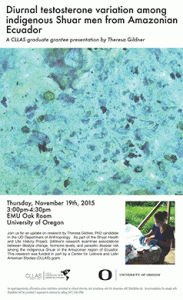 Theresa Gildner, PhD candidate, Department of Anthropology, Abstract: Lifestyle change, hormone levels, and parasitic disease risk among the Shuar in Ecuador—This study examines how hormone levels and economic change influence parasitic infection by comparing rural and urban areas with respect to testosterone profiles and parasite load as part of the Shuar Health and Life History Project. The results will clarify associations between lifestyle change, hormone levels, and parasitic disease risk and will also help target public health strategies and produce knowledge that will be used to help alleviate the physical suffering of participant communities.
Theresa Gildner, PhD candidate, Department of Anthropology, Abstract: Lifestyle change, hormone levels, and parasitic disease risk among the Shuar in Ecuador—This study examines how hormone levels and economic change influence parasitic infection by comparing rural and urban areas with respect to testosterone profiles and parasite load as part of the Shuar Health and Life History Project. The results will clarify associations between lifestyle change, hormone levels, and parasitic disease risk and will also help target public health strategies and produce knowledge that will be used to help alleviate the physical suffering of participant communities.
Dr. Juan Antonio Siller on Colonial Monasteries on the slopes of Popocatepetl: Book Presentation and Lecture
Monday, Nov. 23rd 5:30-7:00 pm McKenzie Hall, 229
5:30-6:00- Presentation of Dr. Siller two books: The Cultural Heritage and Historical Monuments of the State of Morelos, (two publications)
First study on the cultural heritage of the state of Morelos, studies of more than five thousand historic buildings from the sixteenth to the twentieth century in 33 municipalities of the state of Morelos were made. The books were presented at the International Book Fair of Palacio de Mineria de la UNAM. Autonomous University of Mexico City, the first volume in 2014 and the second volume in 2015.
6:00-7:00- Monasteries of the XVI century on the slopes of Popocatepetl volcano, in the states of Morelos and Puebla, Mexico.
Declared Cultural Heritage of Humanity by UNESCO (1995-2015). The route of the monasteries in the sixteenth century and its 14 monumental was declared Cultural Heritage of Humanity in 1994 by UNESCO. It includes eleven sites of Morelos State and three sites of Puebla State. This archaeological project is the route from the sixteenth century sources along 240 kilometers for 10 days walking tour, identifying the original routes, which still function as ways of pilgrimage to Chalma from the east of the Puebla and Morelos states. The route has remained in operation and use for over five hundred years.
JUAN ANTONIO SILLER was born in Ciudad Juarez, Chihuahua, México. He received his architecture degree from the Universidad Nacional Autónoma de México (UNAM), an Archaeology degree from the Escuela Nacional de Antropología e Historia (ENAH), and has a Master’s degree in Museology from the Escuela Nacional de Conservación, Restauración y Museografía ENCRYM INAH. He is a member of the board of the International Council of Museums ICOM and of the National Committee of the International Council on Monuments and Sites (ICOMOS). In addition, he serves as editor of the Mesoamerican Journal of Architecture and is a member of the Prehispanic Architecture Seminar in the Architecture Faculty of the Universidad Autónoma de México (UNAM).
“Maíz y el país: Political Violence in Mexico and Corn’s Lessons for Justice”
“Maíz y el país: Political Violence in Mexico and Corn’s Lessons for Justice” with with Luz Rivera Martínez, organizer with the Consejo Nacional Urbano y Campesino (CNUC) and the Mexico Solidarity Network (MSN). This talk is co-sponsored by Food Studies and Latin American Studies.
Luz Rivera will speak about State-sponsored political violence in Mexico and how corn is a symbol for autonomy and the dignified struggle for a better world. Luz has 20 years of experience constructing autonomy, organizing outside the electoral system, and resisting genetically modified corn while protecting millennia-old varieties. Luz is an amazingly inspiring speaker with a wealth of experience and her talk will have important lessons for anyone interested in human rights, women’s, peasant, and labor movements.
